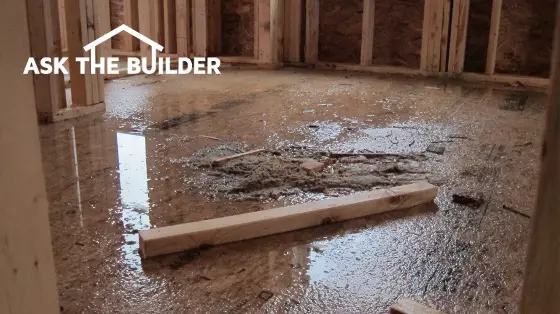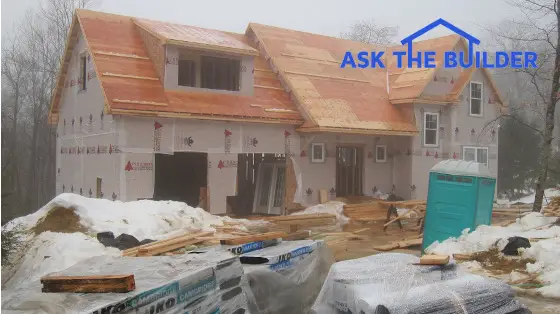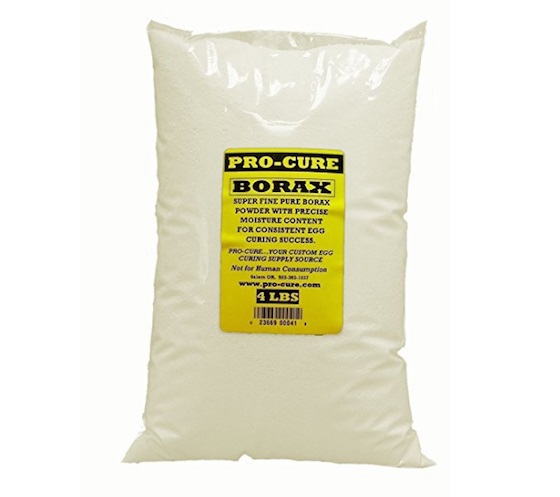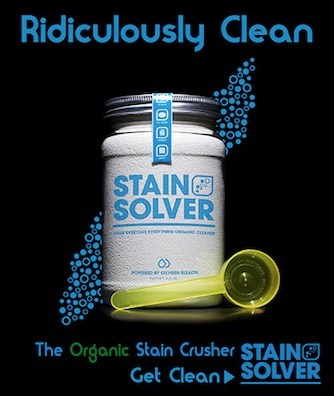Rain Soaked Framing Lumber

The carpenters building this new home are slobs. All sawdust, lumber scraps, etc. should be cleaned up each day in case it rains. © 2017 Tim Carter
Rain-Soaked Framing Lumber TIPS
- Lumber rots slowly
- OSB and plywood made with waterproof glue
- Mold spores are everywhere
- Clean mold with Stain Solver oxygen bleach - See Below
- CLICK HERE to Get Tim's FREE & FUNNY Newsletter!
DEAR TIM: My new home is under construction and the roof is not complete. Our area has received record rainfall for days and days. More rain is in the forecast. Is my house ruined? Will the wood rot? Should I be concerned about mold or any other problems? Is there anything a builder can do to minimize damage to lumber caused by rain and standing puddles on wood floors? Sara G., Trenton, NJ
DEAR SARA: I doubt that your house is ruined by the heavy and persistent rainfall. You'd be shocked how much abuse framing lumber and engineered lumber can take when Mother Nature turns on her faucet.
Waterproof Glue
The glues used to bond layers of wood in exterior-grade plywood and the strands of wood in exterior-grade oriented strand board (OSB) are made to resist water. In fact, most are waterproof.
The actual solid lumber used by many builders for walls, floor joists and roof trusses is naturally resistant to rapid decay by water. It would take many months of being wet for the framing lumber to start to rot.
But these facts do not give you or your builder an unlimited license to allow water to saturate the lumber or stand in puddles on the flat floor surfaces for weeks or months on end. As soon as the moisture content in wood reaches in excess of 20%, decay and staining can begin.
Mold Before Rot
The greater likelihood is that you'll begin to see mold growth long before the wood starts to decay. Often there's an abundance of mold spores in the air at just about every construction site. These spores just need water to start their growth process and some molds can form in as little as 48 hours after getting wet.
My own home was rained upon several times as I built it. I distinctly remember the house getting soaked for several days before the sun came out. As soon as the rain stopped I used a large squeegee to get the standing water off the floor surfaces.
Clean Up Each Day
Because I kept the job site clean on a regular basis, there were no wood scraps or piles of absorbent sawdust that would trap moisture. Once the standing water was off the floors and the sun came out, the wood would dry rapidly with no mold growth, decay or warping.
Stacked Lumber
The lumber on the job site that is at the greatest risk of mold growth or decay is that lumber which is stacked closely together. Often delivery trucks dump piles of lumber on the ground with just a thin 2x4 under the pile.
It's best to put stacks of lumber up on pallets to get air circulating under the lumber.
In many instances the pile of lumber is in direct contact with the soil. If water gets between pieces of lumber or sheets of plywood and/or OSB, it will not easily evaporate. For this reason, it is very important that lumber deliveries be scheduled so that the lumber is used by the carpenters within days, not weeks.

It's winter, it rains and there's uncovered stacked wood all over the job site. This is a house-building train wreck. © 2017 Tim Carter
Air Circulation
Lumber that does sit on the job site should be off the ground at least four inches and be covered by a tarp that protects it from rainfall. The tarp should not be wrapped tightly around the stacked lumber. Water vapor from the ground can build up under the tarp and condense into liquid water.
Install the tarp much like a rain fly on a camping tent.
Waterproof Floor Sheathing
Builders can also take extra precautions to protect framing lumber. Water repellents can be applied to flat expanses of plywood or OSB subflooring. These liquid water-repellent products are easy to apply when no walls are erected on the flat subfloors.
Plywood and OSB that are treated in this manner will rarely swell and delaminate. Modern OSB can be purchased that has a waterproof coating or sealant. I'd get that if you can.
Borate Protection

This is borax powder. You dissolve this in water and spray it onto framing lumber. It helps prevent rot and insect infestation! It's easy to use. CLICK THIS IMAGE TO ORDER IT NOW. IGNORE THE PART ABOUT EGGS. There are many many uses for borax.
Framing lumber such as 2x4s, 2x6s and floor joists can be sprayed with borate solutions.
The borate chemicals are not toxic to humans or other mammals, but they are highly toxic to many species of wood fungi that cause wood rot.
Termites and carpenter ants also dislike lumber treated with borates.
It's best to soak the lumber in borate solutions to get the full treatment, but spraying the borate on lumber that is in place will offer a fairly high level of protection until such time as the house can be roofed.
Clean With Stain Solver

Stain Solver is MADE in the USA with USA ingredients that are food-grade quality. CLICK THE IMAGE to order some NOW.
Mold growth on framing lumber is a common occurrence. The mold can be cleaned using non-toxic Stain Solver.
Stain Solver is a certified organic oxygen bleach made in the USA with USA ingredients.
You mix the pure powder with water, stir until dissolved and spray it on the mold-covered wood. I prefer to use a garden hand-pump sprayer.
Be sure you stir the Stain Solver so all the powder grit is dissolved before placing in the sprayer. Undissolved powder will clog the spray tip.
Serious Damage
Serious damage can happen to houses under construction that are exposed to long periods of wet weather. Light, dry snow and ice are not nearly as bad as standing water.
Cold weather slows the growth process of most organisms including wood fungi and most molds. But snow can be easily removed from the flat surfaces of homes under construction and this should be done as soon as possible after the storm has concluded. Once temperatures rise, the snow will melt and turn into liquid water.
Column 593
26 Responses to Rain Soaked Framing Lumber